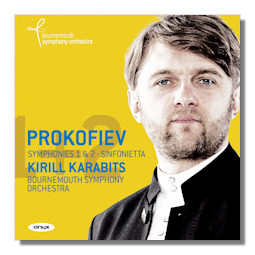
The Internet's Premier Classical Music Source
Related Links
- Prokofieff Reviews
- Latest Reviews
- More Reviews
-
By Composer
-
Collections
DVD & Blu-ray
Books
Concert Reviews
Articles/Interviews
Software
Audio
Search Amazon
Recommended Links
Site News
 CD Review
CD Review
Serge Prokofieff

- Symphony #1 in D Major "Classical", Op. 25
- Symphony #2 in D minor, Op. 40
- Sinfonietta in A Major, Op. 5/48
- Autumnal Sketch, Op. 8
Bournemouth Symphony Orchestra/Kirill Karabits
Onyx 4139 79m
This is the second issue in Kirill Karabits' ongoing cycle of the Prokofiev symphonies. I had much praise for the first volume when I reviewed it here in early 2014 (Onyx 4137). It contained the Third and Seventh Symphonies. On this new disc Karabits offers Symphonies #1 (Classical) & 2, as well as two little known but quite engaging works, the Sinfonietta and Autumnal Sketch. With the arrival of this disc I paused to reflect a moment: in the last month I've received three recordings of Prokofiev's Second Symphony for review, a work which for a long time wouldn't have seen three recordings over a span of a decade or two. Prokofiev's Second was for years among his most neglected major works. Even now it's not exactly a repertory staple: it's his least popular symphony after the early version of Symphony #4 (Op. 47). But I suppose the Second is now emerging as one of the composer's most imposing and successful large works. More about this later.
It's the leadoff piece on this new Onyx CD, and Karabits offers about the most unique interpretation of this two-movement work I've ever encountered. The Second has the reputation of being a rather savage piece, a work, to quote the composer, "made of iron and steel." But Karabits scales down the more thunderous aspects of the symphony, offering a much more thoughtful and detail-rich first movement, which is eleven or twelve minutes of toccata-like music in vein of The Scythian Suite. Normally, one would probably object to any approach that tends to soften the more aggressive or harsh aspects of any score, but here Karabits brings out a new dimension in this movement: the thematic material takes on a more epic character, especially the main theme, and you hear the contrapuntal elements as well as the brilliant orchestration more clearly than in any of the more than dozen recordings available. Try the development section, where many conductors turn the music into a sort of sonic free-for all. Here Karabits allows you to hear all the subtle thematic transformations above the angry brass and busy percussion, and without sacrificing the sense of climactic power.
And the second movement is even more convincing, as all sorts of meaningful often hidden detail emerges: try the first variation (track 3) and notice the yearning strings midway through, which subtly heighten the sense of mystery and restiveness; or sample the fifth variation, where rhythms are deftly punctuated by slashing string effects. Overall, this is easily among the finest Seconds on record. The excellent Alsop recording on Naxos Blu-ray Audio NBD0044, which also contains the Classical Symphony and the early brief orchestral work Dreams, may offer as good or perhaps even a marginally better Second, but the disc times out to twenty-two minutes less content than this very full Onyx disc.
Moreover, Karabits offers a splendid and utterly delightful version of the Classical Symphony and arguably the best recording of the Sinfonietta ever made. This is an early work by Prokofiev in a neoclassical vein dating to 1909 that was revised by the composer in 1929. Dalgat, Jarvi and Muti made excellent recordings of the Sinfonietta but Karabits offers a livelier, more subtly nuanced and more detail-rich performance. Try any movement and notice how alive and vital the playing is: everything seems to be worked out in fine detail, not in a calculated manner though but with a fresh, spontaneous spirit. The lively movements (1, 3, 4 & 5) are utterly infectious. I never before regarded this work very highly, but now I do – Karabits has opened my eyes and ears. The early Rachmaninov-inspired Autumnal Sketch gets a fine performance as well. It's a lovely if somewhat derivative work and Karabits gets the most out of it.
The Bournemouth Symphony Orchestra performs splendidly in all works and Onyx provides vivid and well balanced sound. Notes by Prokofiev biographer Daniel Jaffe are very informative, and Karabits offers an introduction on the music. He calls the Second Symphony "one of the 20th century's more revolutionary and symbolic compositions." I agree and this rather unique recording of it should be in every collection of those with an interest in 20th-century orchestral music. Highest recommendations.
Copyright © 2014, Robert Cummings




















